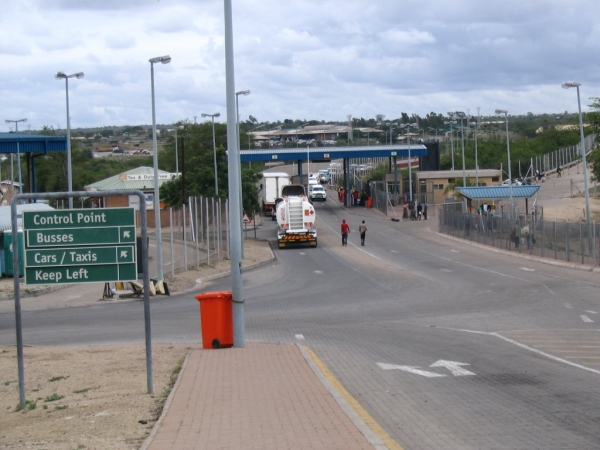How I crossed the border illegally

Every day, hundreds of Zimbabweans cross the Beit Bridge border across the Limpopo River into South Africa - some of them illegally. GroundUp reporter Tariro Washinyira joined them.
It is 1am. The border is quiet. Except for our truck, the great Beitbridge over the river is empty. The Zimbabwean border post is behind us. Across the river, the first of three South African border posts looms.
I am coming back to South Africa by bus from a funeral in Zimbabwe. Pretending not to have a passport, I have joined a woman and a baby, and a man, who also have no passports. The bus driver has told us to get out of the bus to board a truck to cross the bridge.
The truck driver warned us that we should not attempt to walk over the bridge on foot as it is very dangerous. The border jumping process is difficult, he said, confessing that three days before he had returned three times to the Zimbabwe side with his clients before getting them across successfully.
Tonight, unfriendly immigration officers are checking passports individually. They are on serious business and there is no mercy for a person caught without proper documents. They are querying small things like a passport picture and sending many Zimbabweans back.
Our truck reaches the first entry point, which Zimbabweans call the “foot and mouth point” because in the past Zimbabweans would all get out of the bus and walk through treated water to kill foot and mouth disease which used to be rife in Zimbabwe.
The truck driver shows his passport then the officers ask for the passengers’ passports. The driver replies, reaches for his wallet and takes out R100. The officer refuses.”These people paid you more than this”, he says. He is offered R200 and lets us through.
A few metres away we reach a place where lots of cars were parked and immigration officers are patrolling. The truck driver tells us to get out of the truck and sit outside pretending we are waiting for something while he checks if it is safe to drive off. When he thinks it is safe, he asks us to hop into the truck. Before he drives away two officers appear and demand to see our passports. The driver gives them R200 each and is allowed to drive away.
At the last border post he again offers R200. The officers refused it saying it is too little. The truck driver leaves his passport and cell phone and says he will bring money later. He is in a hurry to get us to our bus which is waiting in Musina. We are allowed to go through.
When we get to Musina, the bus is gone, leaving the conductor behind. He says our truck arrived too late and the bus driver could not wait any longer .
The conductor tried to negotiate with a bus from the same company which had been hired by church people coming from a conference in Zimbabwe, but the church people refused to accommodate us. We waited from 3am till 8am, stranded with no food or warm clothes. All our things, including the baby’s nappies and food, were gone with the bus.
Two buses which came from Harare offered to take my fellow travellers on, provided that they pay R250 bus fare and R500 extra since they did not have passports. But they had no cash on them.
The woman phoned her husband who sent her some money for travelling. The other passenger had no choice but to wait for another bus from the same company with the conductor. He arrived in Johannesburg a day later.
Sitting in a taxi at the filling station in Musina is a woman with a three year old baby. She has paid R250 to the taxi driver for transport to Johannesburg but the taxi has not filled up in two days and the driver has refused to refund her. She cannot report the driver to the police because she is also a border jumper - she and the child do not have passports.
Before the border became strict, individuals with no valid passports would pay between R1,000 and R1,500 to a bus driver who would split the money with the immigration officers by the port of entry. One of the bus drivers in the Zimbabwe Road terminal in Harare, where buses depart for South Africa, told GroundUp that many buses are no longer involved in border-jumping activities because of the hefty fines which must be paid if the bus is found with undocumented people.
According to Bulawayo24 News, a Zimbabwean bus operator was recently fined R190,000 after he was caught with 19 passengers attempting to enter South Africa illegally’.
Tariro Washinyira, who lives and works legally in South Africa, went back to get her passport stamped at the Beitbridge border post.
Support independent journalism
Donate using Payfast

Don't miss out on the latest news
We respect your privacy, and promise we won't spam you.
Next: Of social class and door mats
Previous: Hangberg man to sue police

This article is licensed under a Creative Commons Attribution-NoDerivatives 4.0 International License.
